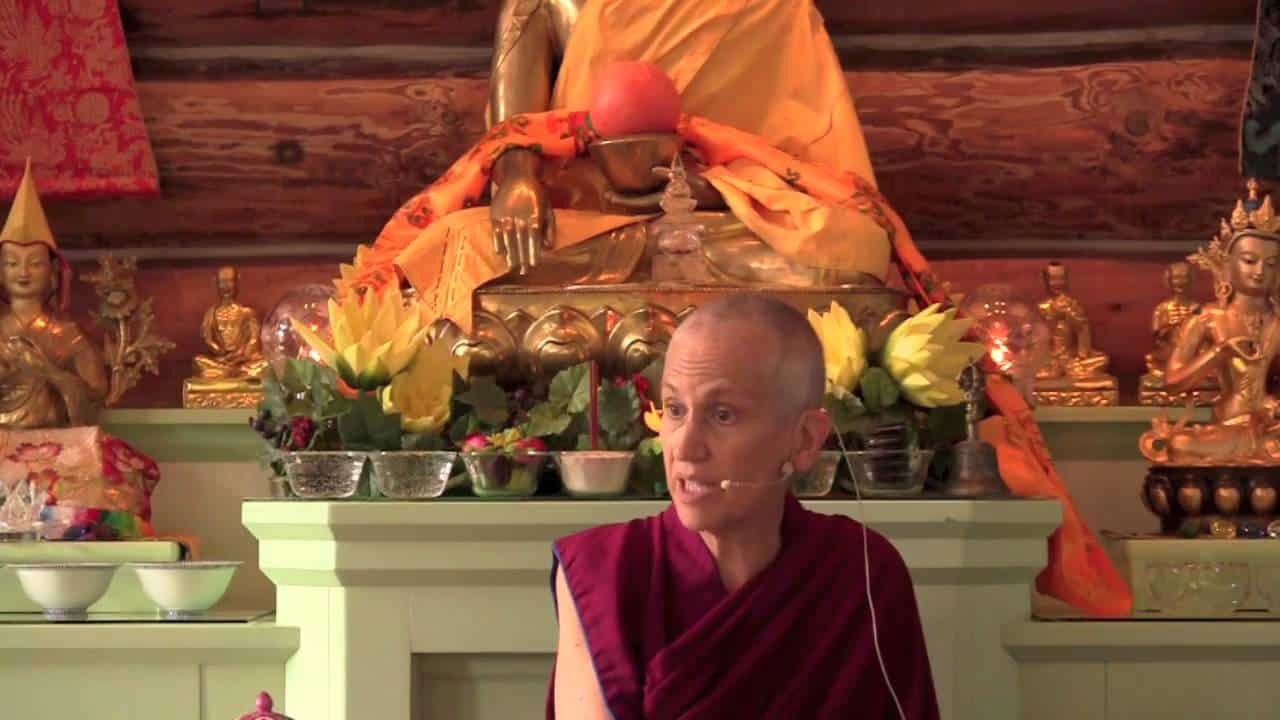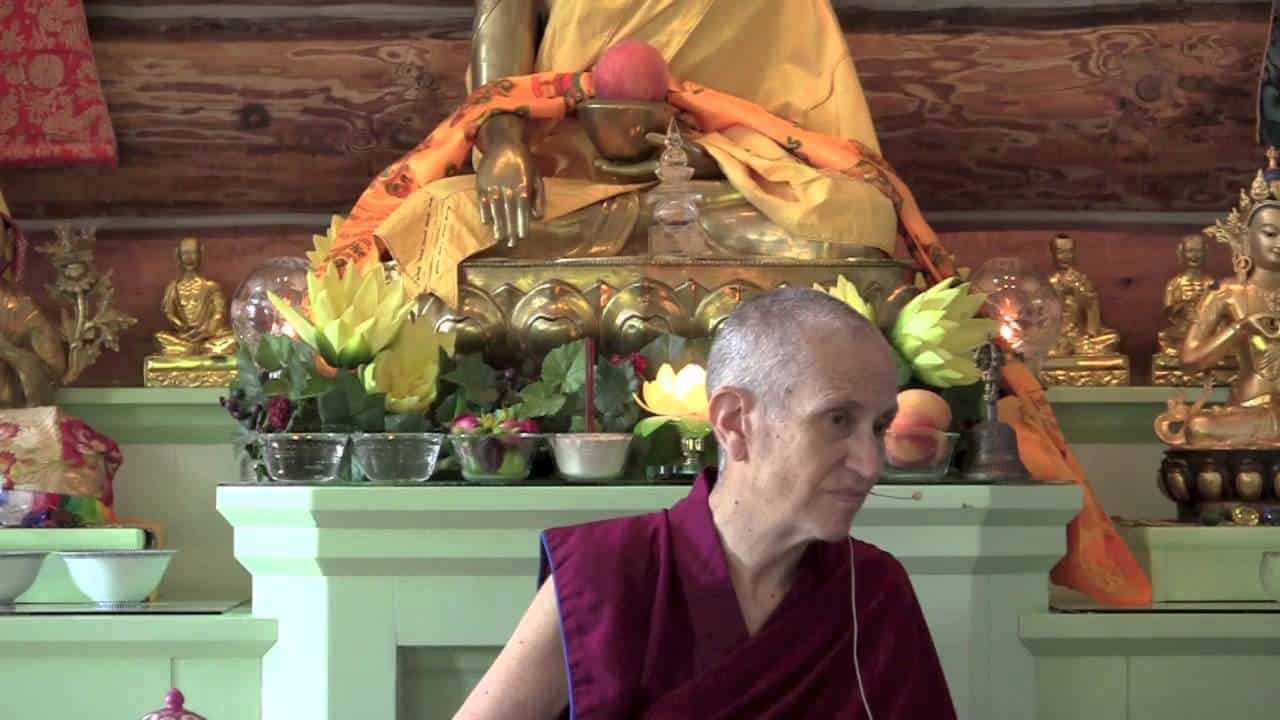Verse 45: The mule
Part of a series of talks on Gems of Wisdom, a poem by the Seventh Dalai Lama.
- When we praise ourselves we actually cause others to think worse of us
- We should practice humility, as the Kadampa masters did
Gems of Wisdom: Verse 45 (download)
Who is the mule braying his inferiority to others?
The person who praises himself to others saying, “I have this and that good quality.”
The point is, when we’re praising ourselves we’re actually acting like an idiot, and instead of having other people think better of us—because they think we have these wonderful qualities that we’re bragging about having—in actual fact they’re going to think worse of us because they know we’re making up a bunch of baloney.
It’s true, isn’t it? Of course, sometimes we like other people to deceive us. We want to hear their candy-like words. Or their sweet, soft words. Because it fulfills some need we have. But when we’re really alert, and we pick up when somebody is just saying a bunch of nonsense about themselves, even if it’s true…. You can be saying nonsense about yourself even if it’s true.
“Oh, I know this important person, I know this important person, I’ve done this, I’ve done that….”
Then how foolish we look when we’re bragging about what we’ve done or who we think we are, even if it is true.
I remember when I first went to Asia in the early 1970s, and my whole motivation for getting all these Buddhist pictures and things like that, and hanging them all over the flat, was so that our friends would come in and look and say, “Where did this come from?”
“Well, that came from India.”
“You were in India?”
“Yes.”
“Wow! You’ve been to India!”
Because in those days hardly anybody went to India. “Yes, look at me. I am a world traveler. I’ve been to all these exotic places….”
So really creating an image that, whether it’s true or not, it makes you look like a mule. [laughter] Because in the market place a mule is worth less than a horse. So here’s this mule, braying about his good qualities, trying to make himself look like a horse, and everybody knows he’s a mule. So, it’s the same thing with us.
Of course, in the American job market you are asked, almost, to make up lies about yourself and to tell people your good qualities, even if you don’t know how to do what is being expected at the job, then you say, “But I learn quickly.” Or, “I kind of know a little bit about that, but I learn very quickly.” Which means, “I don’t know anything.” But you can’t say that. So you have to make yourself look good, and present this image and then hope that they hire you. And then when they hire you, thinking that you have certain abilities, then you have to figure out what to do then. Because it quickly becomes obvious that you don’t have those abilities that they think you have.
It’s a strange kind of system that we have here, where people are encouraged to be mules, and bray about their own good qualities.
In Tibetan culture it’s exactly the opposite. Somebody who talks about his good qualities in front of other people, people really look down on that. If somebody is just kind of bragging and boastful and like that, people just really…. That person…. Don’t trust that person.
And think part of that comes from the Kadampa tradition that came from Lama Atisha. They’re the ones who do the thought-training practices, the lojong practices. And it was so important in their way of training to be able to tell the truth and to be incredibly honest with themselves and not make up an image to somebody. And I really love that way of practicing, I have a lot of respect for it.
There’s one story…. There was one of the Kadampa masters named Baen Gung-gyael. One day he was in someone’s home, a benefactor’s home, and on the table there was a jar of khapse. (Khapse is kind of like Tibetan cookies, their version of cookies. It’s this fried dough.) And the lady of the house went into another room to get a cup of tea or something like that and so Baen Gung-gyael’s eying those khapse, and really wanting them, and kind of opens the lid of the jar and puts his hand in, puts it around a khapse, and then he goes, [grabs his wrist with his other hand] “Come quickly, come quickly, there’s a thief!” [laughter] Because he caught himself doing it and it’s like, “Okay, I’m being a thief. This wasn’t offered to me,” and caught himself. You know, meanwhile the woman of the house is going, “What in the world is going on?” But he needed to be truthful.
There’s another story, I don’t know if it’s Baen Gung-gyael or another one, but you know when they have pujas in Tibetan Buddhism they often pass out food. They serve the meal or they serve tea or something like that when they take a break in the puja and everybody stays there. So at one particular ceremony they were serving some curd, yogurt. So they always start at the front of the line and everybody brings their own bowl, and they serve it. And this one monk towards the back was like looking at this curd because it was a real treat and was like, “Oh, he’s giving really big spoonfuls to all these people and there’s not going to be any left when it comes around to me.” And so finally the person who is passing out the curd comes around to him and is about to put some curd in his bowl, and he turns his bowl upside-down and said, “I’ve already eaten a lot of curd.” [laughter] Because he was eating everybody else’s portion in his mind, out of his own greed. But you know, this ability to be so honest about oneself, that, “Oh I’ve already eaten.” Turn your bowl upside-down.
So, not braying about our good qualities or covering stuff up, but being very honest.
Venerable Thubten Chodron
Venerable Chodron emphasizes the practical application of Buddha’s teachings in our daily lives and is especially skilled at explaining them in ways easily understood and practiced by Westerners. She is well known for her warm, humorous, and lucid teachings. She was ordained as a Buddhist nun in 1977 by Kyabje Ling Rinpoche in Dharamsala, India, and in 1986 she received bhikshuni (full) ordination in Taiwan. Read her full bio.


